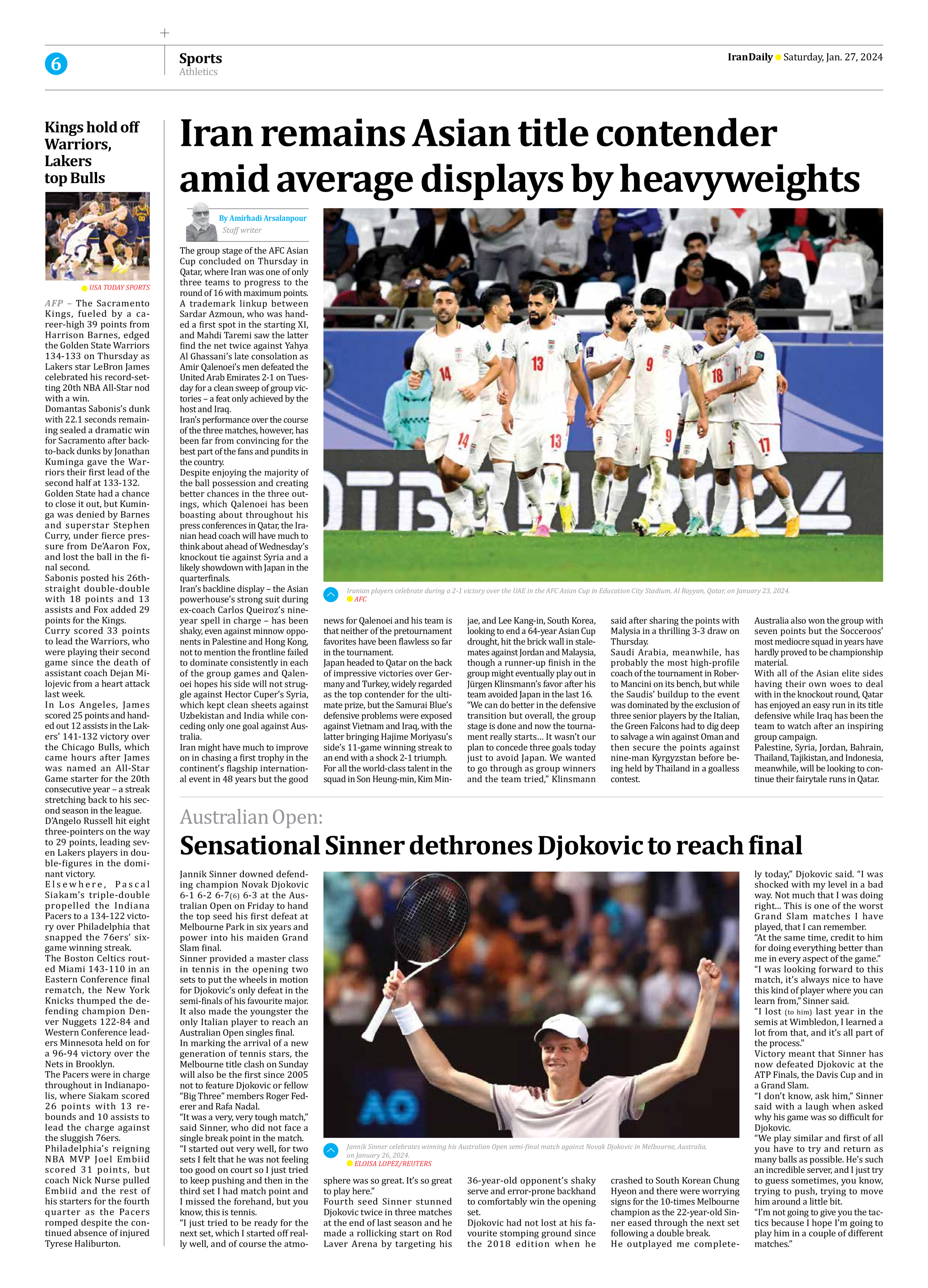
Iran remains Asian title contender amid average displays by heavyweights
By Amirhadi Arsalanpour
Staff writer
The group stage of the AFC Asian Cup concluded on Thursday in Qatar, where Iran was one of only three teams to progress to the round of 16 with maximum points.
A trademark linkup between Sardar Azmoun, who was handed a first spot in the starting XI, and Mahdi Taremi saw the latter find the net twice against Yahya Al Ghassani’s late consolation as Amir Qalenoei’s men defeated the United Arab Emirates 2-1 on Tuesday for a clean sweep of group victories – a feat only achieved by the host and Iraq.
Iran’s performance over the course of the three matches, however, has been far from convincing for the best part of the fans and pundits in the country.
Despite enjoying the majority of the ball possession and creating better chances in the three outings, which Qalenoei has been boasting about throughout his press conferences in Qatar, the Iranian head coach will have much to think about ahead of Wednesday’s knockout tie against Syria and a likely showdown with Japan in the quarterfinals.
Iran’s backline display – the Asian powerhouse’s strong suit during ex-coach Carlos Queiroz’s nine-year spell in charge – has been shaky, even against minnow opponents in Palestine and Hong Kong, not to mention the frontline failed to dominate consistently in each of the group games and Qalenoei hopes his side will not struggle against Hector Cuper’s Syria, which kept clean sheets against Uzbekistan and India while conceding only one goal against Australia.
Iran might have much to improve on in chasing a first trophy in the continent’s flagship international event in 48 years but the good news for Qalenoei and his team is that neither of the pretournament favorites have been flawless so far in the tournament.
Japan headed to Qatar on the back of impressive victories over Germany and Turkey, widely regarded as the top contender for the ultimate prize, but the Samurai Blue’s defensive problems were exposed against Vietnam and Iraq, with the latter bringing Hajime Moriyasu’s side’s 11-game winning streak to an end with a shock 2-1 triumph.
For all the world-class talent in the squad in Son Heung-min, Kim Min-jae, and Lee Kang-in, South Korea, looking to end a 64-year Asian Cup drought, hit the brick wall in stalemates against Jordan and Malaysia, though a runner-up finish in the group might eventually play out in Jürgen Klinsmann’s favor after his team avoided Japan in the last 16.
“We can do better in the defensive transition but overall, the group stage is done and now the tournament really starts… It wasn’t our plan to concede three goals today just to avoid Japan. We wanted to go through as group winners and the team tried,” Klinsmann said after sharing the points with Malysia in a thrilling 3-3 draw on Thursday.
Saudi Arabia, meanwhile, has probably the most high-profile coach of the tournament in Roberto Mancini on its bench, but while the Saudis’ buildup to the event was dominated by the exclusion of three senior players by the Italian, the Green Falcons had to dig deep to salvage a win against Oman and then secure the points against nine-man Kyrgyzstan before being held by Thailand in a goalless contest.
Australia also won the group with seven points but the Socceroos’ most mediocre squad in years have hardly proved to be championship material.
With all of the Asian elite sides having their own woes to deal with in the knockout round, Qatar has enjoyed an easy run in its title defensive while Iraq has been the team to watch after an inspiring group campaign.
Palestine, Syria, Jordan, Bahrain, Thailand, Tajikistan, and Indonesia, meanwhile, will be looking to continue their fairytale runs in Qatar.







